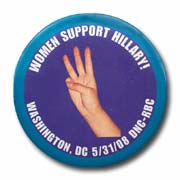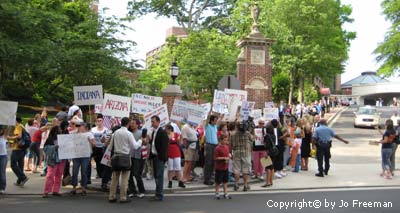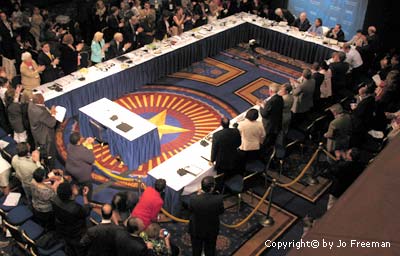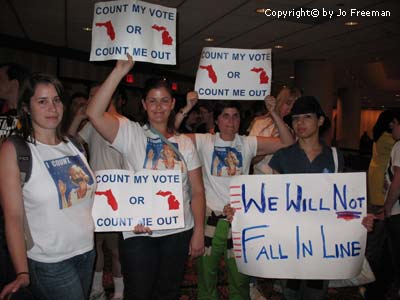
Count Every Vote or Play by the Rules?

Two thousand angry voters, mostly Hillary supporters with a scattering of Obamians converged from all over the country on a meeting of the Rules and Bylaws Committee of the Democratic National Committee held in Washington, D.C. on May 31, 2008. They shouted and chanted to "Count Every Vote" on the streets of a quiet DC neighborhood while the RBC met in a nearby hotel. It was there to hear testimony and decide whether to allow delegates from Florida and Michigan to participate in the 2008 Democratic National Convention. The two dozen or so protesters still present at the end of the day when the Committee announced its decision went home mad.
Although the Hillary for President campaign carefully stayed away from organizing these protests, her supporters did their own thing. Two new NYC groups joined together to organize the rally, but were supported by others in its execution. In March, a group of Democratic women activists formed "Count Every Vote ‘08" to support Clinton and "other qualified women candidates across the country." The WomenCount PAC was created on May 12 by "a group of women who had traveled together around the country to campaign for Hillary." Initially, they raised money to run ads in the major media. Many more Hillary supporters were mobilized by such entities as the Hillary Rapid Responders.

Four buses arrived from New York City before 7:00 a.m., and about ten made the much longer trip from Florida. Mostly people came on their own, especially from the neighboring states of Maryland, Virginia and Pennsylvania. A car of "Hill-raisers" drove up from Kentucky. One young man took a bus from Boston and another flew out from California. Signs proclaimed protesters from Colorado, Iowa, Michigan, Illinois, Indiana, Minnesota and Missouri.

They broke mid morning for a short rally. After many buses returned to home states, the remaining few hundred people took up their positions at the entrances to the hotel driveways, trading shouts and honks with passing cars. After a drenching downpour mid-afternoon, those who were left, retreated inside.

The Dispute
The origin of the dispute was an attempt by the DNC to impose some order on the Democratic presidential primary selection process – one in which each state legislature and the state parties are the only ones who can make binding decisions on when and how voters can pick a candidate or select delegates to a convention.
In August of 2006, the DNC issued its rule on timing of presidential primaries. It deferred to the tradition of the Iowa Caucus and New Hampshire primary going first, and said that Nevada and South Carolina were the only other states that could hold a primary or caucus in January.
The DNC felt that these two states added regional and ethnic diversity to the early contests while still being small enough that candidates for the Democratic nomination wouldn’t have to raise large amounts of money for major media buys. All other states had to wait until February 5 or later. A year later the eight Democratic candidates pledged not to campaign in any other state that held a primary or caucus before February 5.
Both the Michigan and Florida Democratic parties held extensive discussions with the RBC throughout 2007 without coming to agreement. Therefore, when those states finalized their primary dates as January 15 and 29 respectively, the DNC informed each state party that its delegates would not be seated and could not vote.
Senator Obama took his name off of the Michigan ballot and his supporters in Michigan told voters to vote "Uncommitted." Clinton, Dodd, Kucinich and Gravel left their names on the Michigan ballot. Clinton received 55% of almost six hundred thousand votes, Uncommitted got 40% and Kucinich got 4% – too little to qualify for any delegates. Women cast 57% of the Democratic votes.
Florida did not provide a means for removing names from the ballot once certified, so all candidates remained on it. Clinton got almost 50%, Obama 33% and Edwards 14% of the 1.67 million Democratic votes. The other five candidates each received less than one percent. Women were 59% of these voters.
On March 12, Jon Ausman, a DNC member from Florida, challenged the decision of the RBC to not seat the Florida delegates. On May 12, Mark Brewer, chairman of the Michigan Democratic Party, filed a similar challenge.
The RBC Meeting
In the weeks leading up to the May 31 meeting, RBC members were deluged with e-mails and letters, most from Clinton supporters demanding that they seat both state delegations at the convention. DNC committee meetings are open to the public. Anticipating an extraordinarily large turnout, the DNC posted on its webpage a means of applying for a guest credential beginning on May 27. All spots were taken within five minutes of becoming available. Upon arrival at the hotel, "guests" discovered that most guest credentials did not readily give access to the RBC meeting itself, but to an "overflow" room at a different hotel where the proceedings could be viewed on a screen.

To keep from being overwhelmed by demonstrators, the DNC also hired several dozen security guards in addition to those employed by the hotel. They guarded all the doors, carefully scrutinizing the passes and refusing entry to anyone without the specific pass to enter that door.
At the entrances to the hotel, guards and DNC staff turned away any member of the public who did not have a DNC confirmation or could otherwise prove that they had a right to be in the hotel. This was somewhat inconvenient for normal hotel guests and attendees at a medical conference being held that day.
The RBC has 28 members plus two co-chairs – equally divided by gender in keeping with the Democratic Charter. The RBC members from Michigan and Florida could not vote on their own challenges. Two others were absent but sent proxies. Co-chairs Jim Roosevelt Jr. (grandson of FDR) and Alexis Herman (Clinton’s Secretary of Labor) could only vote if there was a tie. There were no ties.
Four people testified for each state: the challenger, and a representative of the state party, the Obama campaign and the Clinton campaign. Ironically, all four agreed within each state, but Michigan demanded more than did Florida.
The argument Jon Ausman made for Florida was one only a lawyer could love. Citing sections of the party Charter and the various rules, he said that the RBC had no authority to deny delegate status to a state’s unpledged ex officio delegates – i.e. DNC members, Senators and Representatives (aka superdelegates). He also claimed that the rules permitted only a 50% reduction in the pledged delegates for a violation. When the RBC took away all of Florida’s votes, it overreached its authority. He accepted a loss of 50% of the votes of the 185 pledged delegates as the price Florida had to pay for violating the rules.
Florida State Senator Arthenia Joyner, representing the Clinton campaign, and Cong. Robert Wexler, representing the Obama campaign, agreed with the Ausman proposal. However, when Wexler was asked if he would like a decision giving back Florida all of its votes he danced a verbal jig rather than say yes or no. More votes for Florida would mean more votes for Clinton.
Michigan state chairman Mark Brewer asked for all of his state’s 157 seats and votes. The main point of his argument was that New Hampshire shouldn’t always go first (after Iowa), and that it too had violated the rules when it refused to allow Nevada to hold its caucus before the New Hampshire primary, as the RBC had recommended. Michigan claimed that it was being selectively punished.
Brewer also pointed out that Michigan would be a crucial battleground state in November -- one the Democrats could ill afford to offend. He asked that Clinton receive 69 of the 128 pledged delegates and Obama receive 59, as recommended by a working group of the state party formed earlier that year to analyze the results of what everyone agreed was a "flawed" primary.
Senator Carl Levin, representing the Obama campaign, and former Michigan Governor James Blanchard, representing the Clinton campaign, gave this their stamp of approval. The Clinton campaign originally said it was entitled to 73 delegates, but accepted the conclusions of the working group that 69 was a fairer allocation. Outside of Michigan, Clinton loyalists continued to protest that four votes had been "stolen."
Statements by the witnesses and questions from the RBC members frequently met with applause and boos. Although most of the floor seats were reserved for the several hundred DNC members, the people in them were about evenly split between Clinton and Obama boosters. They weren’t all DNC members, but had friends who were.

The RBC finally broke for lunch about 3:00 in the afternoon. When it reconvened three hours later, it was clear that disagreements and been hashed out and a consensus reached on action, even if everyone wasn’t happy about it.
Clinton supporter Alice Huffman of California first moved that Florida receive all of its delegate votes. This provided many RBC members an opportunity to make little speeches and declare their personal positions. Its defeat by 15 to 12 was predictable from the fact that a majority of the people on the RBC supported Obama.
Next came a motion to give Florida all of its delegates, with each getting one half vote. The pledged delegates were allocated at 52.5 for Clinton, 6.5 for Edwards and 33.5 for Obama. Unpledged delegates could cast their half vote as they please. This passed unanimously. (Edwards, who has endorsed Obama, can ask his delegates to follow his lead, but can’t compel them to do so).
The same motion for Michigan also passed, but by 19 to 8. The RCB accepted the state party’s recommended allocation and gave 34.5 (half of 69) votes to Clinton and 29.5 to Obama. Harold Ickes of Washington, D.C., who had voted against the Michigan motion, said that "Mrs. Clinton," reserves the right to take the matter to the convention credentials committee.
The Aftermath
As the RBC committee adjourned, it stood and applauded itself. Hillary supporters at the back of the room began chanting "Madam – President" over and over. Outside the meeting room, the "no go" zone guarded by staff had retreated from the hotel’s entrances to the more immediate area. Just outside the perimeter Hillary supporters held up signs saying "Count My Vote, or Count Me Out" while others tried to talk to the media. Their anger was palpable. "Den-Ver," "Den-Ver," they chanted. Nothing less than total victory would suffice.

Books by Jo | What's New | About Jo | Photos | Political Buttons
Home | Search | Links | Contact Jo | Articles by Jo